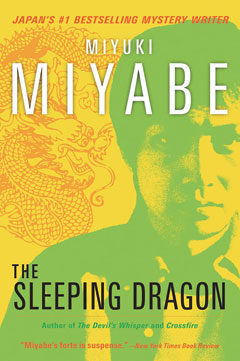
January 14, 2010
Miyuki Miyabe
Originally published on metropolis.co.jp on January 2010 The Sleeping DragonKodansha International, 2009, 304pp, ¥2,730Available from Amazon Japan and Amazon US. The Devil’s Whisper Kodansha International, 2009, 264pp, ¥1,260 Available from Amazon Japan and Amazon US. “The talent is well hidden indeed,” reads a quotation at the start of The Sleeping Dragon. “How else could it […]
By Metropolis
Originally published on metropolis.co.jp on January 2010

The Sleeping Dragon
Kodansha International, 2009, 304pp, ¥2,730
Available from Amazon Japan

The Devil’s Whisper
Kodansha International, 2009, 264pp, ¥1,260
Available from Amazon Japan and Amazon US
.
“The talent is well hidden indeed,” reads a quotation at the start of The Sleeping Dragon. “How else could it have remained submerged for centuries with only the tip of the iceberg showing above a sea of quackery?” The line comes not from some work of classic literature, but the more lowbrow pages of Stephen King’s Carrie. Say what you will about Miyuki Miyabe: at least she acknowledges her influences.
While the mystery queen’s 1998 novel Crossfire (released in English in 2006) cribbed many of its key plot points from King’s Firestarter, her latest work to appear in translation is less indebted to that of her idol. Though it revolves around a troubled—and possibly psychic—adolescent, we’re spared the period pains, pig’s blood and prom night massacre. More’s the pity.
Miyabe’s paranormal teen, Shinji Inamura, is an awkward but otherwise perfectly amiable high school student with an unusual gift. The book’s narrator, magazine reporter Shogo Kosaka, first encounters him stranded by the roadside while driving to Tokyo in a typhoon and gives him a ride. Along the way, the pair happen across an uncovered manhole, and discover that a young boy may have fallen in, presumed drowned. It’s at this point that Shinji lets his incredulous companion in on his secret: he is capable of “scanning” minds and objects, and has managed to glean some details about the people who removed the manhole cover. Unsure whether or not to buy it, Kosaka reluctantly agrees to help him track down the culprits.
It would spoil things to reveal too much of the subsequent story, though it packs more than a few unexpected twists, including a kidnapping plot and another supposed psychic who is more powerful than Shinji. Eh, supposedly.
Sticking with one narrator throughout, Miyabe crafts a more tightly focused—and, ultimately, more gripping—read than she manages in The Devil’s Whisper, which recently appeared in paperback. Here, the omniscient author moves between a variety of characters, lingering longest with the 16-year-old Mamoru Kusaka. Deserted by his father as a young child, Mamoru moved to live with relatives in Tokyo following his mother’s death. The family home is thrown into disarray when his uncle, a taxi driver, runs over and kills a young woman who he claims ran out suddenly into the street. The police aren’t buying it, so Mamoru begins to investigate the case himself.
That turns out to be more complicated than expected, though—involving, as it does, an expert in mind control who has already sent a number of others rushing to their graves. This mystery unfurls in skittish fashion, sometimes serving more as a backdrop for the teenage protagonist’s own coming-of-age drama, as he wrestles with discrimination and bullying at school. In Mamoru, Miyabe has created a surprisingly believable character: there’s something very recognizable about the way that, edging towards adulthood, he is overwhelmed by circumstances yet insists on working through them by himself.
If both books are light on originality, they’re also not without their inventive touches—witness the morally ambiguous villain of The Devil’s Whisper, or the way the narrator of The Sleeping Dragon is often just a bit-player in the main action. Deborah Stuhr Iwabuchi’s translations of both are up to her usual high standards, casting Miyabe’s prose in natural, idiomatic English.







